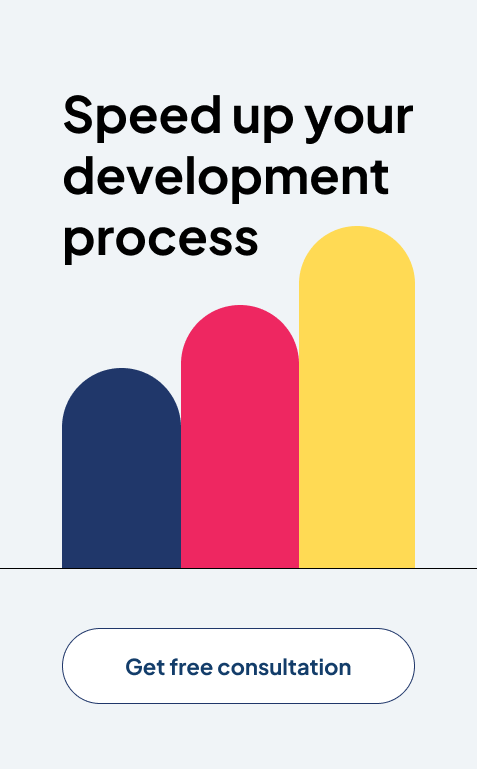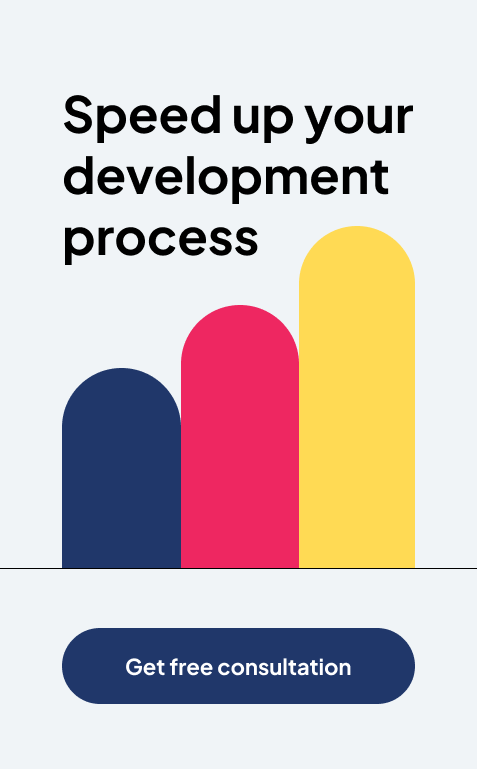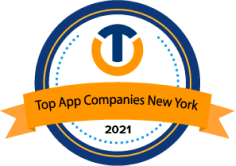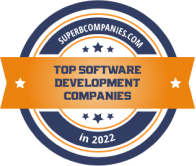How To Convert Your Impressive Idea Into An Impressive App That Users Love
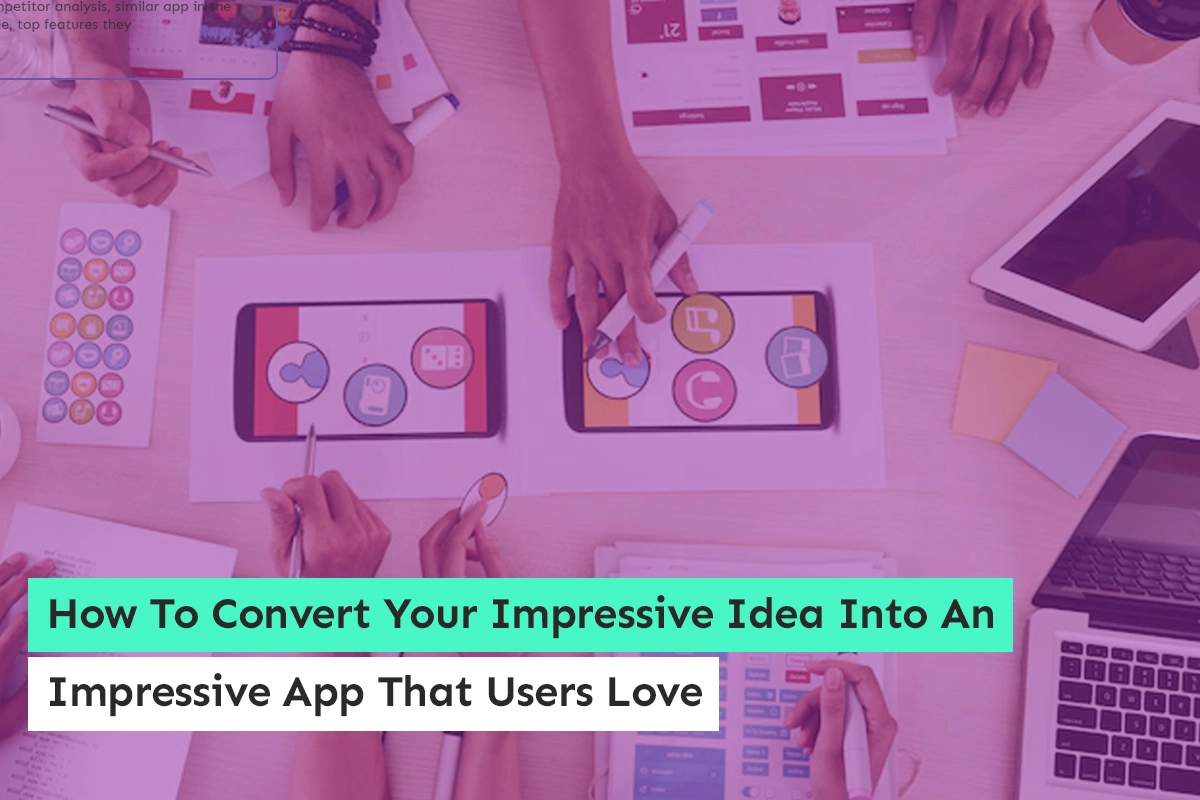
You must have a website developed for your business; that’s why you know how web development projects work. But when it comes to app development, you are maybe not that sure. And it is okay to feel a little confused if you have never ventured into building an app business or an app for your business.
Mobile app development is also a standard process, and it includes similar steps as other software development projects, starting with strategy, design, development and delivery.
Even though it seems like a relatively straightforward process, you may find yourself asking questions at some point. Why does the design have to be perfect? And why is it taking so much time? What is the constant need to test every feature? What are these last-minute changes in code?
We made a simple guide to help you understand the mobile app development process from day one. This will save you a lot of time and bring more clarity on how to make the mobile app development experience frictionless and more engaging.
Throughout the article, we will move from the initial stages to deployment and beyond. Keep hooked.
But before we move forward, let’s briefly discuss why it is crucial to follow a well-structured process for mobile app development.
Why the majority of mobile apps fail?
An insightful blog from fyresite states that only 0.5% of consumer apps and 13% of business apps succeed.
Now, these numbers look way better than the typical dialogue over the internet that only 1 in 10,000 apps sees an audience. This is not true. And the link mentioned above will tell you why.
The main thing to focus on here is that the mobile app development market is a competitive and overcrowded space. But a reality-altering idea, when turned into an app, can make billions.
Here are some success stories for you. Both TikTok and Snapchat exemplify how a good app idea can crush the competition with an MVP.
You know, by the end of 2021, the app revenues are set to hit $35 billion globally!
We are not trying to make it sound like a lot of money. It is a fact that mobile apps are the most viable business idea for tech companies and startups in 2022 and beyond.
App Revenues
We hope you are still not wondering whether developing a new mobile app is a good idea? Because even though there are 5 million+ apps on the internet, there is always a place for a new one.
Every big app idea was once criticized for being new or too out there. But it is also true that disruptive technologies have successfully provided consumers what they want.
But the success of your app startup doesn’t solely rest upon the idea. The development process still remains challenging. So, let’s get started with the mobile app development lifecycle.
Also Read: Are You Looking To Hire React Native Developers To Build Mobile Apps?
Mobile app development process
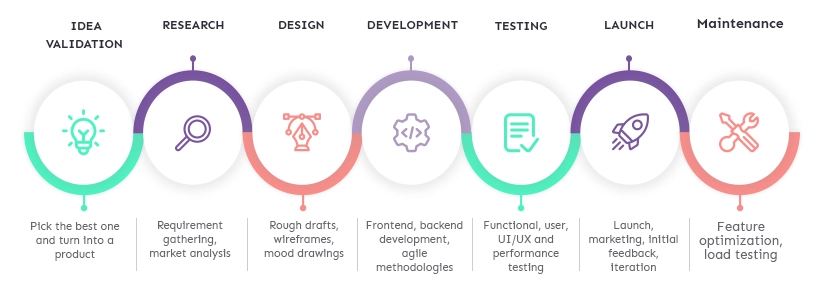
There are many stages in developing a mobile app, from the inception of an idea, design, development, testing and maintenance. We have described the whole process into 7 steps which can help you understand the different stages well.
-
Idea to product
Mobile app ideas range widely across industries, types, revenue models and other metrics. We have had app startup ideas, from building a dating app that recommends people based on social media profiles to an app that allows you to sell your personal data online.
Our mobile app development team has built many apps to understand that every project is different. Some of our clients only have an idea, while others have a list of features or requirements. There are also client scenarios where they want something related to an existing app. Like they want an app like Lyft or Uber.
Sometimes clients have multiple ideas for their business app. We work through them to identify the ones with the most potential to be profitable business assets because not all app ideas are worth building upon.
When we get the idea from a client, the first step is to understand and articulate as much as we can about the app. Which audience will the app be built for? What does the ideal user persona look like? Which platform to build it on? What will be the monetization model? What is your business goal for the project? Who are the competitors in the same niche? Do you have a marketing strategy?
The goal here is to get it from an idea to a product.
Once we know what the app idea will look like as a product, what the client will be offering, their project goals and deadlines, we move on to the next step of analytics and research.
Our standard process in mobile app development projects is to conduct interviews with the clients to get familiar with the business environment and the market they operate in. We dive in relentlessly to grasp as many aspects of the project as possible.
-
Research

Now, the app startup idea is transformed into a tech product on paper. It is time to connect with reality. Research and analytics are crucial to the app’s success. A thoroughly carried out research helps craft a more refined product strategy. Conducting research saves the cost and time of the development process.
Also Read: The Most Trending Online Marketplace Apps In 2021
Our team researches several factors for a mobile app product:
1. Technology
The tech stack influences the cost of MVP directly. It is always recommended to hire expert mobile app developers to help you make profitable decisions despite the constraints. These experts pick up the backend and frontend technologies, tools, platforms, APIs, servers and more.
During the research, our primary goal is to find the best selection of powerful, effective, trending technology with active community support.
2. Audience
The next piece of the research puzzle is your app audience. We map out your future users – their likes, dislikes, their ambitions, goals, habits, daily routines, what they desire, device preferences, what they think about. All this info is required to create as accurate user personas as possible.
3. Business model
What’s the point of building an app if it’s not useful for the audience? Also, if it doesn’t generate revenue for the business? Both of the situations are important to deploy a successful app. There are different app monetization models, and it is crucial to decide which one to pick before the development and design phase. Or else how would the team know which features to build first.
Also Read: Here Is The Secret To Secure Huge Funding For Your App
With NFTs, more creative ways of monetization will be on the rise. So we plan the app’s business model, which is consistent with your brand’s identity and the services you provide.
4. Marketing analysis
Diving into app development without knowing what’s out there in your niche is wasting your money. We study the competition and see what they’ve created to solve similar problems. What features are in their app, which tech stack they’ve used, what the users like about their app, and how can we provide a better alternative to the existing ones?
The goal of research is to get faster time to market to integrate user feedback ASAP and reduce time and development costs.
With all the information gathered via analysis and user interviews, we select the tech stack, build a product development strategy and create a clear vision for the app. After research, we provide an accurate estimate of how and when the MVP will be deployed.
-
Design
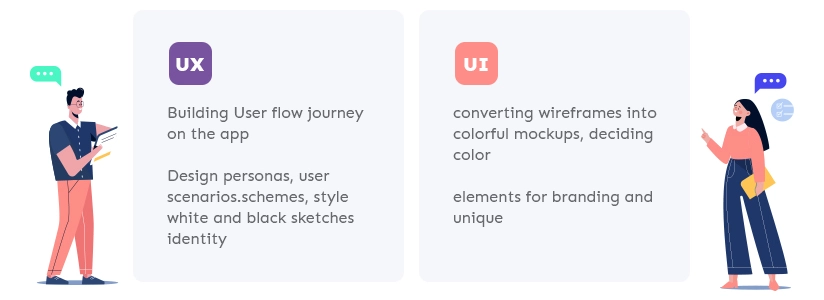
Design is an exciting phase of app development. The app starts to look like the actual product you’ve imagined. It unfolds in two parts – the UX design and UI design. The design stage is not entirely focused on app interfaces. Instead, our UI/UX experts create customer journey mapping, data architecture, features placement, and more.
Many experts, UI/UX designers, data analysts, product managers, and coders are involved in designing.
We start with UX design, defining user personas user scenarios and then move into features, designing sketches and wireframes. After UI design, the fast prototyping of your app is complete, and by the end, there is a visual representation of every screen of your soon to be app product.
The goal of design is to create visually detailed prototype documents for developers.
To get the right app design, have constant interaction with the UI/UX team of developers, designers, PMs as much as possible. Design is an integral part of the app development process because it affects the user experience directly.
To avoid a second round of designing, our mobile app UI/UX designers discuss multiple approaches for UX and UI visuals. After consulting with the client and keeping their business needs in mind, our team moves on to assign tasks.
Also Read: How To Test If An App Has An Audience Before Building It?
-
Development
Development is the tech-heavy and active phase of the app development process. Mobile app developers start with the completed UI/UX designs and begin rendering the MVP.
We make sure that the whole team is in the loop during the development phase while transiting from designers to developers. We clarify the design details before coding.
The goal of development is to build a super-efficient & functional app with immersive visuals and engaging designs.
We select teams depending upon the specification of the application. We engage a set of developers for cross-platform apps built with react native, which has a single codebase. If your business app is a native application, both iOS and Android engineers work simultaneously to develop the application.
However, for complex backend configuration, we add an extra skillset to the project along with a QA engineer.
After our mobile app experts are done, you can try a new application. It is now ready for a trial run.
-
Testing
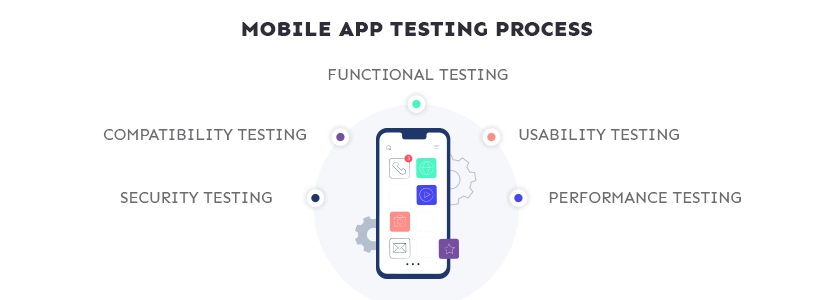
When the coded app skeleton is ready, it is time to test the features, identify bugs and add improvements. This is the beta test run. We present the app to you to get early feedback. Our testers and QA specialists run several types of tests to ensure function, usability, and performance.
The goal of testing is simple – to make the app flawless before the final release.
Our team also tests the app on different platforms and devices to ensure everything is rendering well on all screen sizes. Once all the bugs are fixed and anomalies are removed, the app is ready for market.
-
MVP Launch
After beta testing, we are in the final app development stages. We make sure that your application is uploaded and ready to perform. We run tests with users during testing and QA check to get onboarding feedback.
The goal is to launch the app for initial feedback then make improvements via iteration.
Once our team says yes to everything, it’s time to upload the app online. If you are a first-time app owner, our team of expert mobile app developers will help you set up an account. It is also necessary to provide tech support and answer users’ queries. As soon as the application is approved, your app will be available for download in a week.
-
Maintenance & optimization
This is the final stage of turning your idea into an actual functional application. After the launch, it seems like everything’s done but a new member on the table – the users. It would be best to study users’ behavior on the app, which feature they are using the most, what navigation issues they are facing and then modify the app for a better experience.
The goal is to get as many downloads as possible.
The more people you can get to download your app, the more data you’ll have to make improvements accordingly.
The maintenance of the app includes:
- Promoting your app through marketing and PR
- Analyzing user feedback for further product development
- Providing tech support
- Developing new app features
- Listen to customers’ demands
Depending upon your app idea, you may need to hire a mobile app maintenance team for small or large apps. We can provide you with the experts you’ll need to sustain and grow your app on a budget.
Conclusion
Users spend a lot of time on mobile apps in a day. While building an app for your business or startup is a perfect idea, you must understand that you are venturing into a very competitive environment.
Without proper planning, development and maintenance of the app, it can result in a big loss.
Follow the app development process – research, design, development, testing, launch and maintenance. It is crucial to foresee all these idea implementation phases to save time and money. Simply start with turning your idea into a product, specify the technical requirements then proceed with documentation and budget.
Also, make a marketing plan before the final launch. You must begin implementing the marketing campaign three months before the official release.
Keep redefining the product with cool new features that resonate with users and generate an irreplaceable market position.
Ready to build your first app?
Contact Imenso software to hire mobile app development team and estimate your idea.
Similar Posts

Hybrid Working Model: A New Normal For Businesses After The Pandemic
It’s over a year since the vaccinations were hurling in, being tested for the new mutations of coronavirus, and everyone was asked to stay home. Now the world has moved past the pandemic and brought enterprise executives’ attention to a new problem – getting employees back to the office. ...
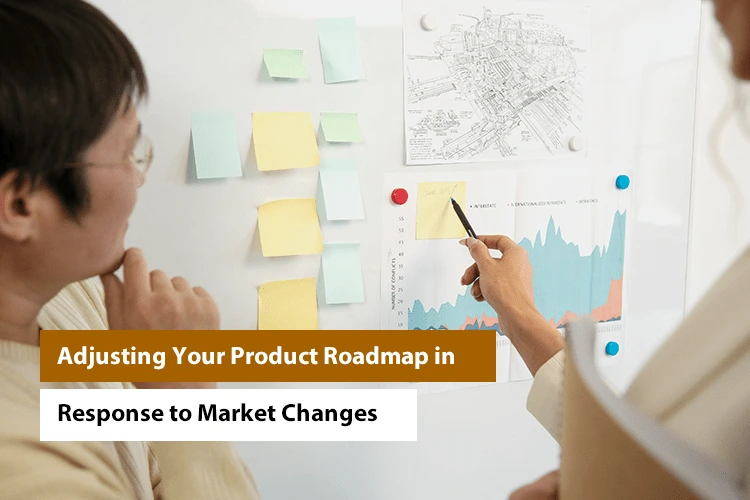
Adjusting Your Product Roadmap in Response to Market Changes
Is your product roadmap flexible enough to handle sudden market changes? Market dynamics are constantly evolving and so should your roadmap, what worked yesterday might not work tomorrow. The changes happen so fast that the business cannot keep up leading to obsolete business practices and loss of opportunities. But there is a solution- adjusting product […]...
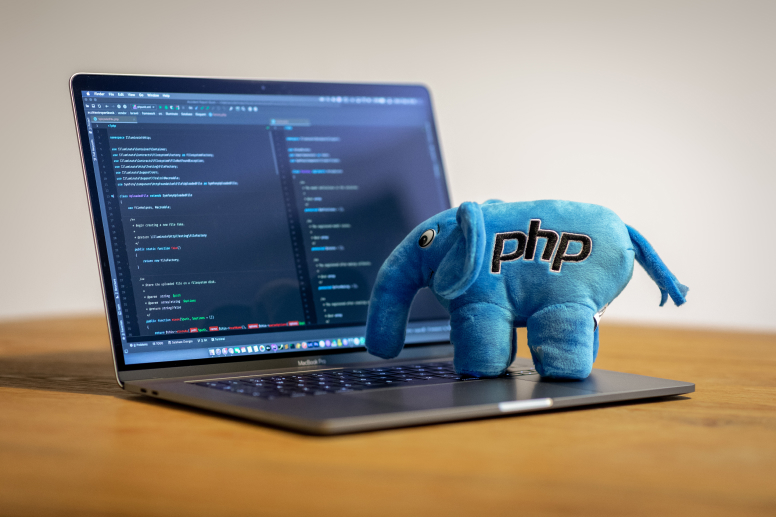
Exploring the Power of PHP: Use Cases and Best Practices
Are you a developer seeking a powerful and versatile solution for your web development projects? Have you been pondering over the perfect language to breathe life into your innovative ideas and turn them into reality? Look no further, as we present to you the answer to your web development quest: PHP – a dynamic scripting […]...

